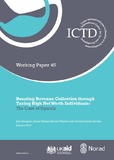Boosting Revenue Collection through Taxing High Net Worth Individuals: The Case of Uganda

Download
Date
2016-01Author
Kangave, Jalia
Nakato, Susan
Waiswa, Ronald
Zzimbe, Patrick Lumala
Metadata
Show full item recordImpact
Abstract
For over a decade Uganda’s tax-to-GDP ratio hovered between 12 per cent and 13 per cent, despite various amendments to tax laws and reforms in tax administration. Part of the low revenue contribution can be attributed to factors external to the Uganda Revenue Authority (URA), such as the structure of the economy – particularly the prevalence of the informal sector and the ubiquity of cash transactions. Another explanation is that poor revenue collection is a result of factors internal to the URA. One of these factors is that the URA’s enforcement efforts have concentrated on taxing corporate entities at the expense of individuals. With the exception of employees, very few individuals comply with their tax obligations outside those incurred at points of importation. Specifically, many wealthy individuals in the private and public sector either do not pay taxes or grossly under-declare their income. The consequence is that very little tax is being collected from this category of taxpayers.
This paper explores the potential for increasing tax revenue by taxing High Net Worth Individuals (HNWIs) through various lenses, including examining the legislative and administrative framework governing the taxation of individuals, collaborative efforts between the URA and other government agencies to improve tax administration, and mechanisms in place to support the sharing of taxpayer information both within the URA and with third parties. We highlight the strengths and weaknesses in the legal and administrative frameworks, with the underlying aim of designing an approach for taxing HNWIs. This paper discusses the findings of phase one of a two-phase project. The second phase will conduct a comparative study on taxation of HNWIs in other jurisdictions, with the aim of developing guiding principles for taxing Uganda’s HNWIs.
